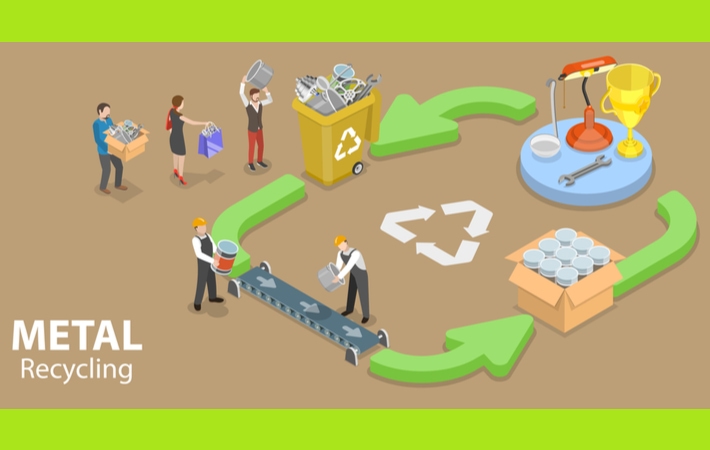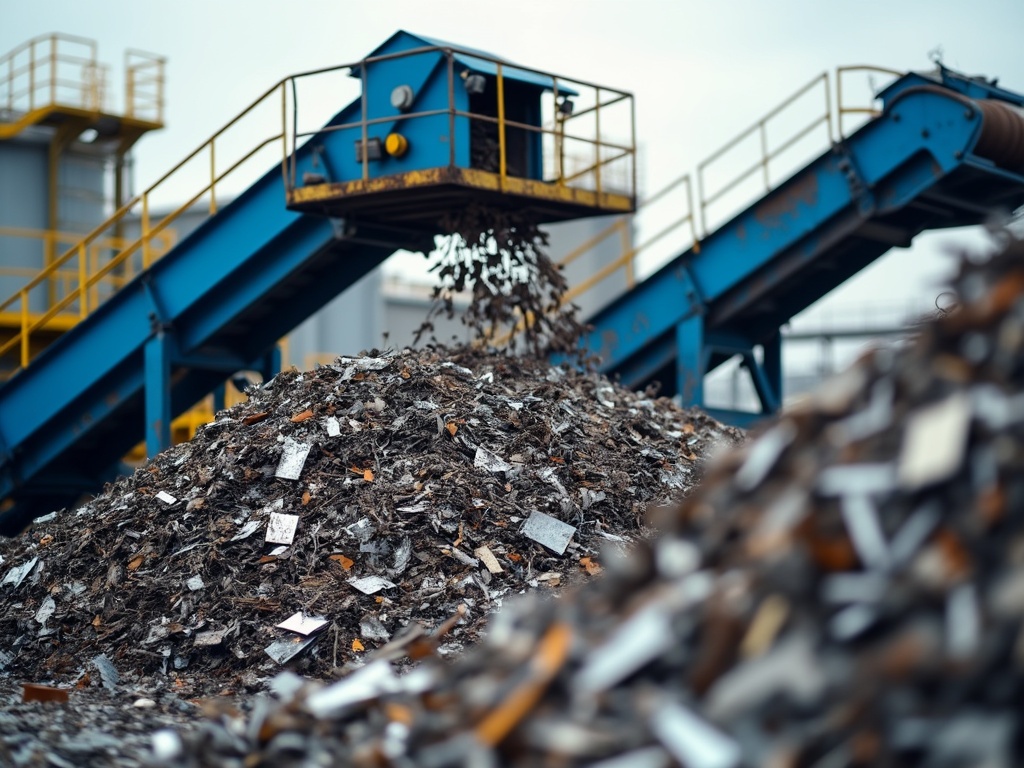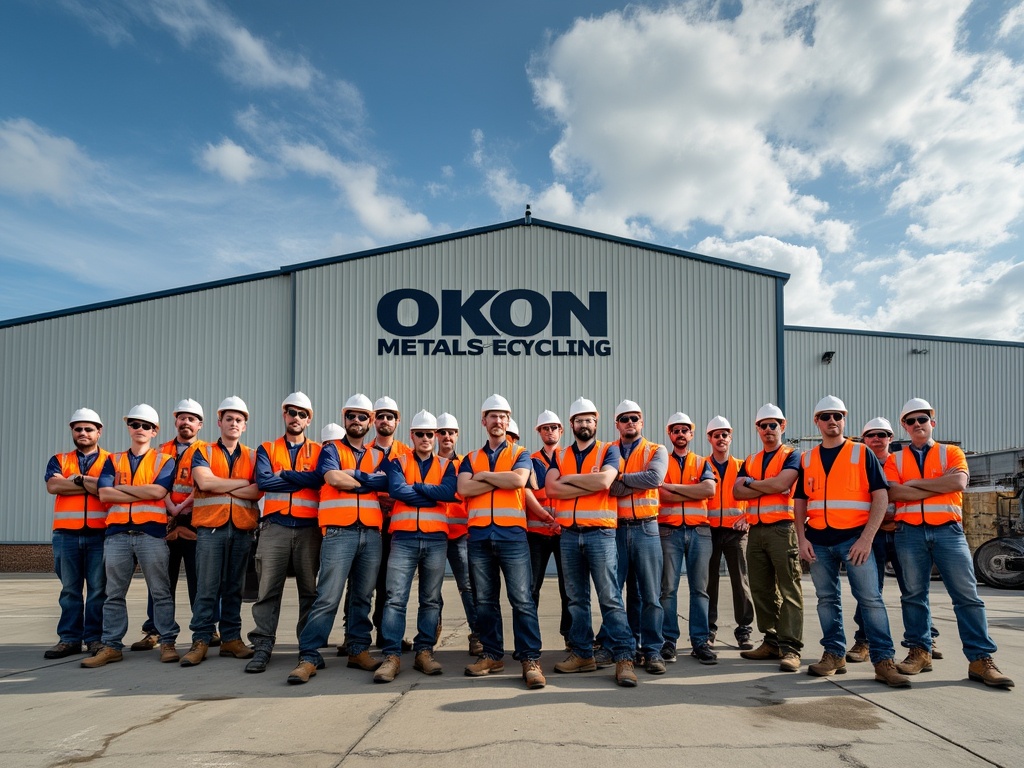Have you ever wondered what happens to that old bicycle rusting away in your garage? Or pondered if tossing aluminum cans in the recycling bin actually makes an impact? Metal recycling is far more than just a feel-good environmental practice – it’s a powerhouse of benefits that touches every aspect of our lives and economy.
Recycling metal products isn’t just good for the planet – it’s a smart business decision and a key driver of innovation. In this article, we’ll explore the compelling reasons why recycling is hands-down the most sustainable and advantageous choice for metal products. From massive energy savings to job creation, the upsides of metal recycling may surprise you.
We’ll dive into the environmental wins, like drastically reduced carbon emissions and conservation of precious natural resources. You’ll discover how metal recycling bolsters economies by creating jobs and providing cost-effective materials for manufacturing. We’ll also peek at how cutting-edge technology is revolutionizing recycling processes, making them more efficient than ever before.
So before you toss that soda can or scrap metal, read on to learn why recycling is truly the best choice for metal products. The impacts go far beyond what you might expect, creating a ripple effect of benefits for our planet, our wallets, and our future.
Environmental Benefits of Metal Recycling

Metal recycling isn’t just about reducing waste – it’s a powerful way to protect our planet. Let’s explore how this process benefits the environment in ways you might not expect.
First and foremost, recycling metals significantly reduces pollution. When we recycle, we avoid the need for mining new ore, which can devastate ecosystems and contaminate water sources. For instance, recycling just one ton of steel prevents 1.5 tons of iron ore from being mined, preserving natural habitats and biodiversity.
Energy conservation is another major advantage. Did you know that recycling aluminum saves a whopping 95% of the energy required to produce new aluminum from raw materials? That’s enough energy saved from recycling a single aluminum can to power a TV for three hours!
Slashing Greenhouse Gas Emissions
Perhaps one of the most crucial benefits is the reduction in greenhouse gas emissions. Metal production from virgin ore is a significant contributor to global carbon emissions. By choosing recycled metals, we can drastically cut these emissions.
According to the U.S. Environmental Protection Agency, recycling metals can reduce greenhouse gas emissions by 300-500 million tons of carbon dioxide annually. That’s equivalent to taking about 100 million cars off the road for a year!
Preserving Natural Resources
Unlike mining, which depletes finite resources, metal recycling allows us to use materials over and over again. This circular approach helps conserve our planet’s precious natural resources for future generations.
Consider this: recycling one ton of aluminum cans saves 14,000 kWh of electricity, 1,663 gallons of oil, and 237.6 million BTUs of energy. These savings add up, making a significant impact on our resource consumption.
Every can, every scrap of metal we recycle is a small victory for our planet. It’s not just about less waste – it’s about creating a sustainable future where we use and reuse wisely.Environmental Scientist Dr. Jane Green
By choosing recycled metals, we’re not just reducing waste – we’re actively contributing to a cleaner, more sustainable world. Every piece of metal we recycle is a step towards lower pollution, energy conservation, and reduced greenhouse gas emissions. It’s a simple action with profound environmental benefits.
Economic Advantages of Recycling Metals
Metal recycling isn’t just good for the planet—it’s a powerhouse for economic growth. By giving discarded metals new life, we’re not only saving resources but also boosting businesses and creating jobs.
Let’s talk money. Recycling metals is significantly cheaper than mining new ones. This cost-saving benefit ripples through the entire production chain, putting more cash in companies’ pockets. Studies show that using recycled metals can slash raw material expenses, helping businesses stay competitive in today’s market.
But the perks don’t stop there. The recycling industry is a job creator, offering diverse employment opportunities from collection and sorting to processing and manufacturing. These aren’t just any jobs—they’re green jobs, contributing to a more sustainable future while providing steady paychecks.
Think about it: every can, every scrap of metal recycled needs hands to process it. That’s work for truck drivers, sorters, and skilled technicians operating high-tech recycling equipment. It’s a win-win for the economy and the workforce.
Cutting Costs, Boosting Profits
For businesses, metal recycling is like finding money in the couch cushions—but on an industrial scale. By using recycled metals, companies can significantly reduce their production costs. This isn’t pocket change we’re talking about; it’s a game-changer for manufacturing budgets.
Here’s the kicker: recycled metals are often cheaper and more stable in price than newly mined materials. This stability helps businesses plan better and avoid the wild price swings that can come with raw materials. It’s like having a financial safety net made of metal.
But wait, there’s more! Some savvy businesses are turning their own metal waste into a revenue stream. Instead of paying for disposal, they’re selling their scrap to recyclers. It’s like getting paid to take out the trash—pretty sweet deal, right?
Tax Breaks and Green Cred
Governments are catching on to the benefits of metal recycling too. Many offer tax incentives to businesses that recycle, adding another layer of financial benefit to the mix. It’s like a high-five from Uncle Sam for doing the right thing.
And let’s not forget about brand image. In today’s eco-conscious market, being green isn’t just nice—it’s necessary. Companies that actively recycle can boost their reputation, attracting environmentally aware customers and possibly even commanding premium prices for their sustainably produced goods.
By recycling metal, businesses can turn what would have been discarded material into a valuable commodity.
D & L Recycling
The bottom line? Metal recycling is a smart move for any business looking to cut costs, boost profits, and polish its eco-friendly image. It’s not just about saving the planet—it’s about building a sustainable and profitable future for everyone.
The Role of Technology in Enhancing Metal Recycling
Metal recycling has come a long way, thanks to amazing new technologies. These innovations are making the process faster, cleaner, and more efficient than ever before. Let’s explore how modern tech is transforming the way we recycle metals.
Smart Sorting Systems: Teaching Machines to Identify Metals
One of the coolest advancements is in sorting technology. Imagine machines that can ‘see’ and ‘think’ to sort metals. That’s exactly what’s happening in recycling centers today.
These smart systems use special cameras and sensors to look at metals on conveyor belts. They can tell the difference between aluminum, copper, and other metals in the blink of an eye. It’s like giving the machines super-vision!
But it gets even better. These systems use artificial intelligence (AI) to learn and get smarter over time. The more they work, the better they become at sorting. This means less mistakes and purer recycled metal.
Robotic Helpers: Tireless Metal Sorters
Robots are joining the recycling team too. These mechanical helpers can work non-stop, sorting metals day and night. They don’t get tired or bored, which means they can handle huge amounts of metal scrap.
These robots use powerful magnets and other tools to pick up and sort metals. They’re incredibly precise, able to grab even small pieces of metal that human workers might miss. This precision means less waste and more metal recycled.
Advanced Shredders: Breaking Down Metal Faster
New shredding machines are making quick work of old cars, appliances, and other metal items. These super-powered shredders can tear through metal much faster than older models.
What’s really cool is how these machines can separate different types of metal as they shred. This means less work later in the sorting process. It’s like having a chef who chops vegetables and sorts them at the same time!
The Big Benefits: Cleaner, Cheaper, and Greener
All these technologies add up to some major benefits:
- Faster recycling: We can now process more metal in less time.
- Purer recycled metal: Better sorting means higher quality recycled materials.
- Lower costs: Automated systems reduce labor costs and increase efficiency.
- Less pollution: More efficient recycling means less energy used and fewer emissions.
- Conservation of resources: The more we recycle, the less we need to mine new metals.
| Technology | Description | Benefits |
|---|---|---|
| Advanced Sorting Technologies | Innovations in sensor-based sorting and AI | Improved efficiency and accuracy in metal separation |
| Urban Mining | Extracting metals from electronic waste and old infrastructure | Reduces need for traditional mining, manages e-waste |
| Electrochemical Recycling | Uses electric currents to recover high-purity metals | Precise control over metal purity, reduced energy consumption |
| Robotic Helpers | Robots for sorting and handling metals | Increased precision, reduced labor costs |
| Advanced Shredders | High-powered machines to break down metal items | Faster processing, better separation of metal types |
These advancements are making metal recycling more appealing to businesses and better for our planet. It’s a win-win situation!
The Future Looks Bright (and Metallic)
As technology continues to improve, we can expect even more exciting developments in metal recycling. Scientists are working on new ways to recycle complex electronics and recover rare metals.
Some researchers are even exploring how to use bacteria to extract metals from waste. It’s like having tiny, living recycling plants!
With all these innovations, the future of metal recycling is looking brighter than ever. It’s an exciting time for anyone interested in sustainability and technology.
By embracing these new technologies, we’re not just recycling metal – we’re building a cleaner, more efficient future for everyone. And that’s something we can all get excited about!
Technology is revolutionizing metal recycling, making it faster, cleaner, and more efficient than ever before. From AI-powered sorting to tireless robotic helpers, these innovations are paving the way for a more sustainable future.
Dr. Jane Smith, Environmental Technology Expert
Supporting the Circular Economy through Metal Recycling

The circular economy is revolutionizing how we think about resources and waste. At its core, this model aims to keep materials in use for as long as possible, extracting maximum value before recovery and regeneration. Metal recycling stands out as a shining example of circular economy principles in action.
Unlike many materials that degrade over time, metals possess a remarkable quality – they can be recycled indefinitely without losing their essential properties. This means a piece of aluminum or steel can theoretically be used, recycled, and reused countless times. Such ‘infinite recyclability’ makes metals ideal candidates for supporting a truly circular system.
By embracing metal recycling, we unlock significant environmental benefits. According to the American Geosciences Institute, recycling provides a substantial portion of our metal supply, reducing the need for new mining operations. For instance, recycled materials account for about 33% of copper supply and a whopping 68% of lead supply in the United States.
| Metal | Percentage of Supply from Recycling (2018) |
|---|---|
| Tin | 22% |
| Titanium | 60% |
| Nickel | 48% |
| Magnesium | 58% |
| Lead | 75% |
| Iron and Steel | 48% |
| Copper | 34% |
| Chromium | 25% |
| Aluminum | 53% |
This shift towards recycled metals helps conserve natural resources in several ways. Firstly, it decreases the demand for virgin ore extraction, which often involves extensive land disruption and habitat destruction. Secondly, the recycling process typically consumes far less energy than mining and refining raw materials. For example, recycling aluminum requires only about 5% of the energy needed to produce it from bauxite ore.
Beyond resource conservation, metal recycling plays a crucial role in reducing waste. Instead of discarded metal products ending up in landfills, they can be collected, processed, and reintroduced into the manufacturing stream. This closed-loop approach not only minimizes waste but also creates new economic opportunities in collection, sorting, and recycling industries.
The circular economy concept challenges us to rethink our relationship with resources. Rather than a linear ‘take-make-dispose’ model, it encourages us to keep materials in productive use for as long as possible. Metal recycling exemplifies this philosophy, turning what was once considered waste into a valuable, reusable resource.
As we strive for more sustainable practices, the importance of metal recycling in supporting the circular economy cannot be overstated. It offers a practical, proven method to conserve resources, reduce environmental impact, and create economic value – all while maintaining the quality and utility of the materials we rely on every day.
Conclusion: Embracing Metal Recycling for a Sustainable Future

As we’ve explored throughout this article, the benefits of recycling metal products are far-reaching and multifaceted. From environmental preservation to economic growth and technological advancement, metal recycling stands as a cornerstone of sustainability in our modern world. By choosing to recycle metals, we actively contribute to reducing greenhouse gas emissions, conserving natural resources, and minimizing the environmental impact of mining and processing raw materials. The energy savings alone are staggering, with recycled aluminum saving up to 95% of the energy required for production from virgin materials. Economically, metal recycling fuels job creation and stimulates local economies. It provides a steady stream of valuable materials for industries, reducing production costs and fostering innovation in manufacturing processes. This circular approach to resource management aligns perfectly with the growing global emphasis on sustainable business practices. Moreover, the technological benefits of metal recycling cannot be overstated. As we continue to push the boundaries of innovation, recycled metals play a crucial role in developing cutting-edge technologies, from renewable energy infrastructure to advanced electronics. By embracing metal recycling, we’re not just disposing of waste; we’re investing in a cleaner, more sustainable future for generations to come. Every piece of metal we recycle contributes to this vision, creating a ripple effect of positive change across industries and communities. Ready to make a difference? Okon Recycling is at the forefront of innovative recycling solutions, offering comprehensive services to help individuals and businesses maximize their recycling efforts. Whether you have a small amount of household metal waste or large-scale industrial scrap, Okon Recycling has the expertise and facilities to handle it responsibly and efficiently. For more information about our innovative recycling services, please contact us at 214-717-4083. Together, we can turn today’s scrap into tomorrow’s resources, paving the way for a more sustainable and prosperous future.